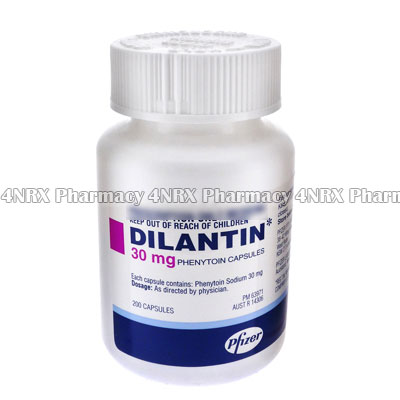 |
Home  Neurological Health Neurological Health  Dilantin (Phenytoin Sodium) Dilantin (Phenytoin Sodium) |
|
|||||||||
|
|
Dilantin (Phenytoin Sodium)
What is Dilantin (Phenytoin Sodium) used for? Dilantin (Phenytoin Sodium) is an anti-epileptic drug prescribed to treat patients suffering from epilepsy or seizures associated with brain surgery. The medication operates by slowing down and regulating nerve impulses in the brain associated with seizures to prevent them from occurring. Your doctor may also prescribe its use for the treatment of other unlisted conditions. How should I use Dilantin (Phenytoin Sodium)? Dilantin (Phenytoin Sodium) should be used according to the isntructions of your doctor to ensure the safest and most effective results from treatment. The normal dosage is one tablet administered two to three times each day dependong on your age, weight, health condition, and the severity of your symptoms. These should be swallowed with a large glass of water and may be taken on an empty stomach, although a snack or meal is suggested prior to use if you experience nausea. Do not crush, split, or chew the tablets prior to use if you experience nausea. What are the side effects of Dilantin (Phenytoin Sodium)? Some patients using Dilantin (Phenytoin Sodium) have reported experiencing side effects such as:
Stop using the medication and contact your doctor as soon as possible if you experience any worrying or serious symptoms such as fever, flu symptoms, mild tremors, chest pain, irregular heartbeats, trouble breathing, unusual changes in skin colour, sensitive skin, easier bruising, severe confusion, urinary retention, severe stomach pain, darkened urine, discoloured stools, jaundice, or signs of an allergic reaction including skin rashes, swelling, or severe breathing problems. These conditions may require lower doses, reduced application frequency, or emergency medical attention in serious cases to prevent further health problems from occurring. Please Note Dilantin (Phenytoin Sodium) should not be used by patients who are lactose intolerant, fructose intolerant, allergic to hydantoins, or who have had a bad reaction to similar treatments in the past. Also inform your doctor if you have diabetes, uraemia, porphyrias, decreased liver function, if you drink large amounts of alcohol, or if you are of Thai or Han Chinese ethnicity. These conditions may cause unexpected problems requiring adjustments to your regimen. Strictly use Dilantin (Phenytoin Sodium) as prescribed and follow all instructions provided by your doctor. Safe, suitable, and optimum dosage can vary and is dependent on the patient`s health and medical history, as well as the condition you are treating. Dilantin (Phenytoin Sodium) may not be safe or suitable for all patients. Always ensure your doctor is informed if you are pregnant or breastfeeding, using any other type of medication (including non-prescription medicine, vitamins, and supplements), as well as if you have any allergies, other illnesses, or pre-existing medication conditions. Seek immediate medical attention or proceed to your nearest accident and emergency department if you suffer a hypersensitive or allergic reaction. Symptoms usually present during a reaction of this nature include difficulty breathing or swallowing, swelling of the limbs or face, tight chest, hives, and skin rashes. 
|
||||||||||||||||||